Literature Review and Research Methodology
VerifiedAdded on 2020/07/22
|11
|3220
|419
AI Summary
The provided document is a compilation of literature reviews and research methodologies on various topics, including employee engagement, social responsibility, risk factor models for neurodevelopmental outcomes in children born preterm or with very low birth weight, rural development through industrialization, microfinance, self-help groups (SHGs), and more. It also includes research methodologies such as talanoa research methodology, transformational sustainability research methodology, and foundations of nursing research. The document aims to provide a comprehensive understanding of these topics and their applications in different fields.
Contribute Materials
Your contribution can guide someone’s learning journey. Share your
documents today.
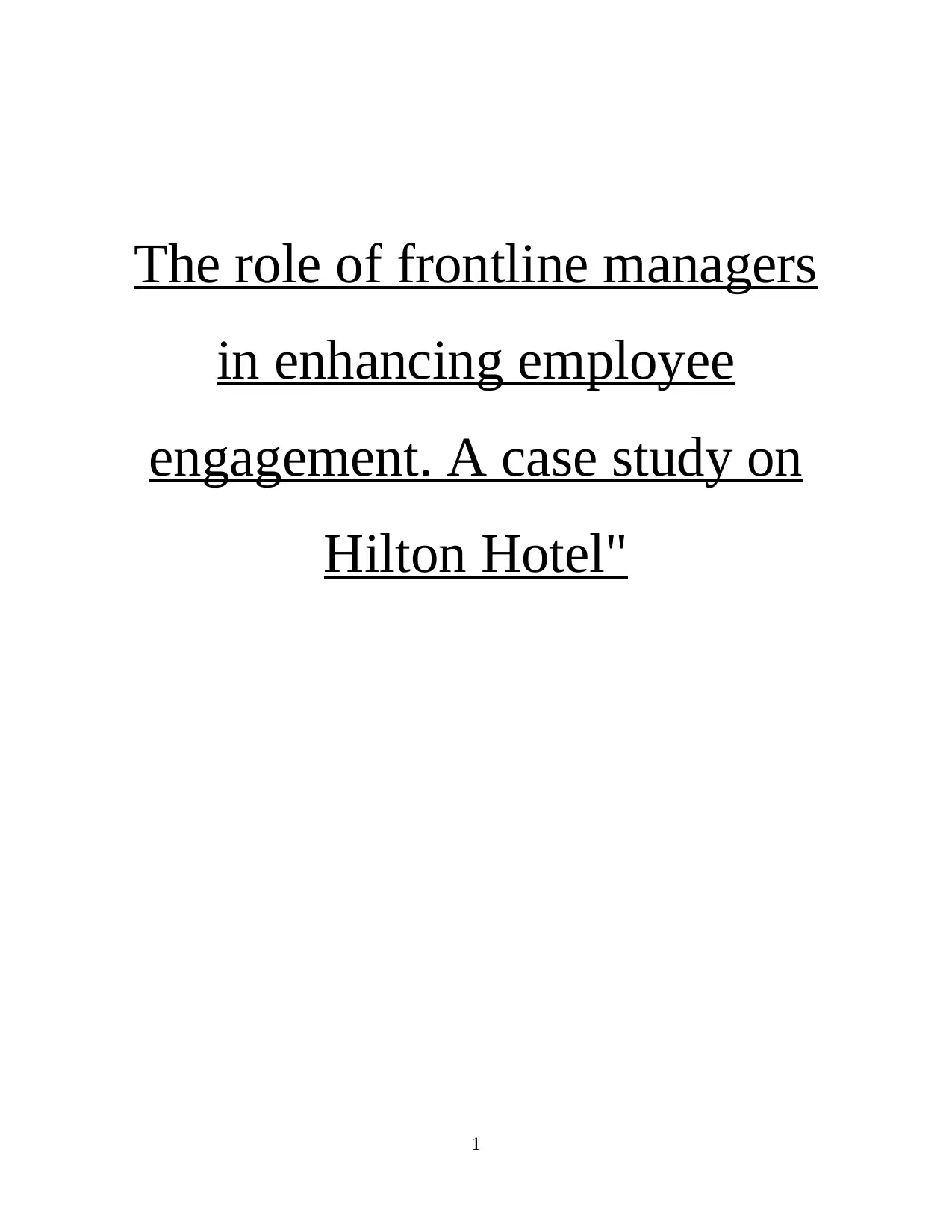
The role of frontline managers
in enhancing employee
engagement. A case study on
Hilton Hotel"
1
in enhancing employee
engagement. A case study on
Hilton Hotel"
1
Secure Best Marks with AI Grader
Need help grading? Try our AI Grader for instant feedback on your assignments.
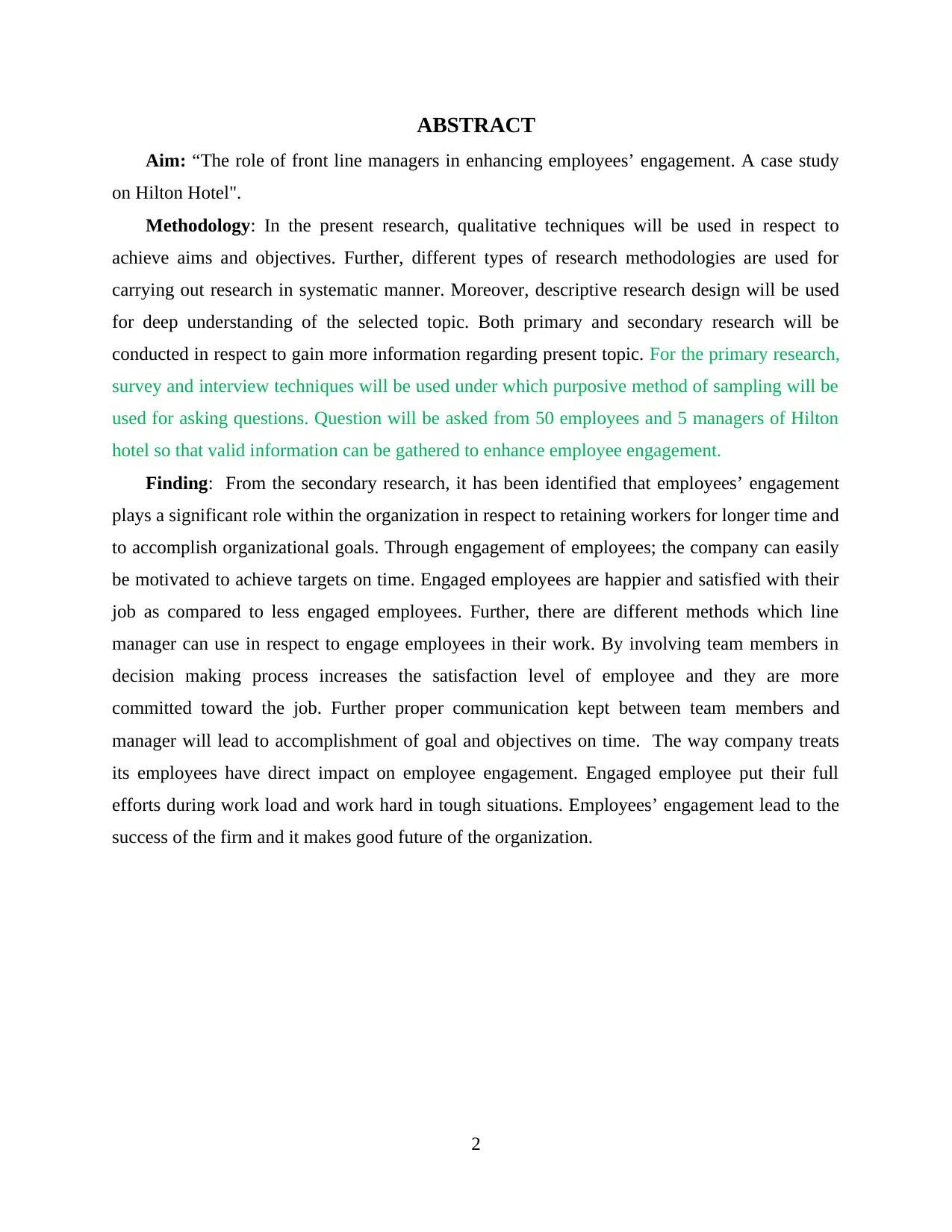
ABSTRACT
Aim: “The role of front line managers in enhancing employees’ engagement. A case study
on Hilton Hotel".
Methodology: In the present research, qualitative techniques will be used in respect to
achieve aims and objectives. Further, different types of research methodologies are used for
carrying out research in systematic manner. Moreover, descriptive research design will be used
for deep understanding of the selected topic. Both primary and secondary research will be
conducted in respect to gain more information regarding present topic. For the primary research,
survey and interview techniques will be used under which purposive method of sampling will be
used for asking questions. Question will be asked from 50 employees and 5 managers of Hilton
hotel so that valid information can be gathered to enhance employee engagement.
Finding: From the secondary research, it has been identified that employees’ engagement
plays a significant role within the organization in respect to retaining workers for longer time and
to accomplish organizational goals. Through engagement of employees; the company can easily
be motivated to achieve targets on time. Engaged employees are happier and satisfied with their
job as compared to less engaged employees. Further, there are different methods which line
manager can use in respect to engage employees in their work. By involving team members in
decision making process increases the satisfaction level of employee and they are more
committed toward the job. Further proper communication kept between team members and
manager will lead to accomplishment of goal and objectives on time. The way company treats
its employees have direct impact on employee engagement. Engaged employee put their full
efforts during work load and work hard in tough situations. Employees’ engagement lead to the
success of the firm and it makes good future of the organization.
2
Aim: “The role of front line managers in enhancing employees’ engagement. A case study
on Hilton Hotel".
Methodology: In the present research, qualitative techniques will be used in respect to
achieve aims and objectives. Further, different types of research methodologies are used for
carrying out research in systematic manner. Moreover, descriptive research design will be used
for deep understanding of the selected topic. Both primary and secondary research will be
conducted in respect to gain more information regarding present topic. For the primary research,
survey and interview techniques will be used under which purposive method of sampling will be
used for asking questions. Question will be asked from 50 employees and 5 managers of Hilton
hotel so that valid information can be gathered to enhance employee engagement.
Finding: From the secondary research, it has been identified that employees’ engagement
plays a significant role within the organization in respect to retaining workers for longer time and
to accomplish organizational goals. Through engagement of employees; the company can easily
be motivated to achieve targets on time. Engaged employees are happier and satisfied with their
job as compared to less engaged employees. Further, there are different methods which line
manager can use in respect to engage employees in their work. By involving team members in
decision making process increases the satisfaction level of employee and they are more
committed toward the job. Further proper communication kept between team members and
manager will lead to accomplishment of goal and objectives on time. The way company treats
its employees have direct impact on employee engagement. Engaged employee put their full
efforts during work load and work hard in tough situations. Employees’ engagement lead to the
success of the firm and it makes good future of the organization.
2
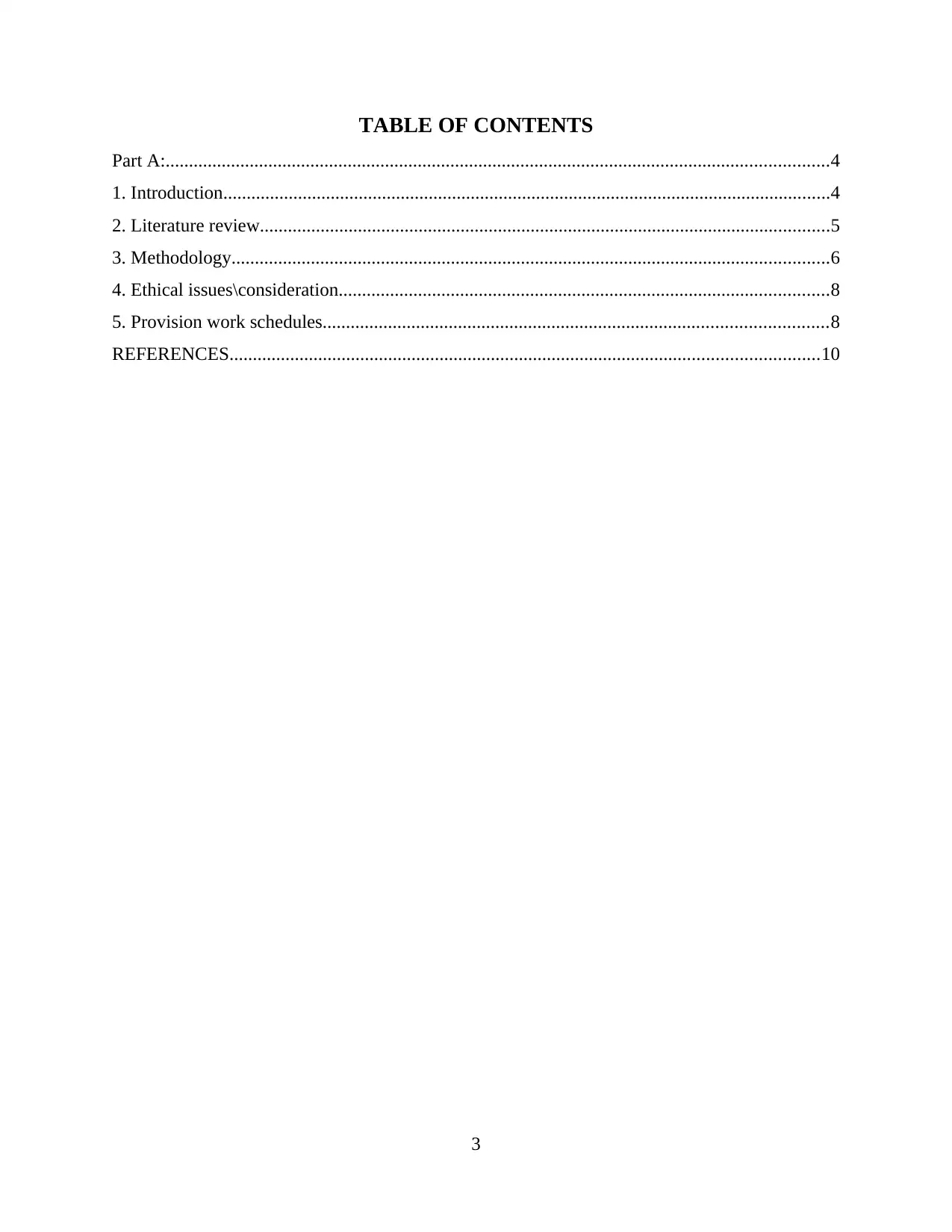
TABLE OF CONTENTS
Part A:..............................................................................................................................................4
1. Introduction..................................................................................................................................4
2. Literature review..........................................................................................................................5
3. Methodology................................................................................................................................6
4. Ethical issues\consideration.........................................................................................................8
5. Provision work schedules............................................................................................................8
REFERENCES..............................................................................................................................10
3
Part A:..............................................................................................................................................4
1. Introduction..................................................................................................................................4
2. Literature review..........................................................................................................................5
3. Methodology................................................................................................................................6
4. Ethical issues\consideration.........................................................................................................8
5. Provision work schedules............................................................................................................8
REFERENCES..............................................................................................................................10
3
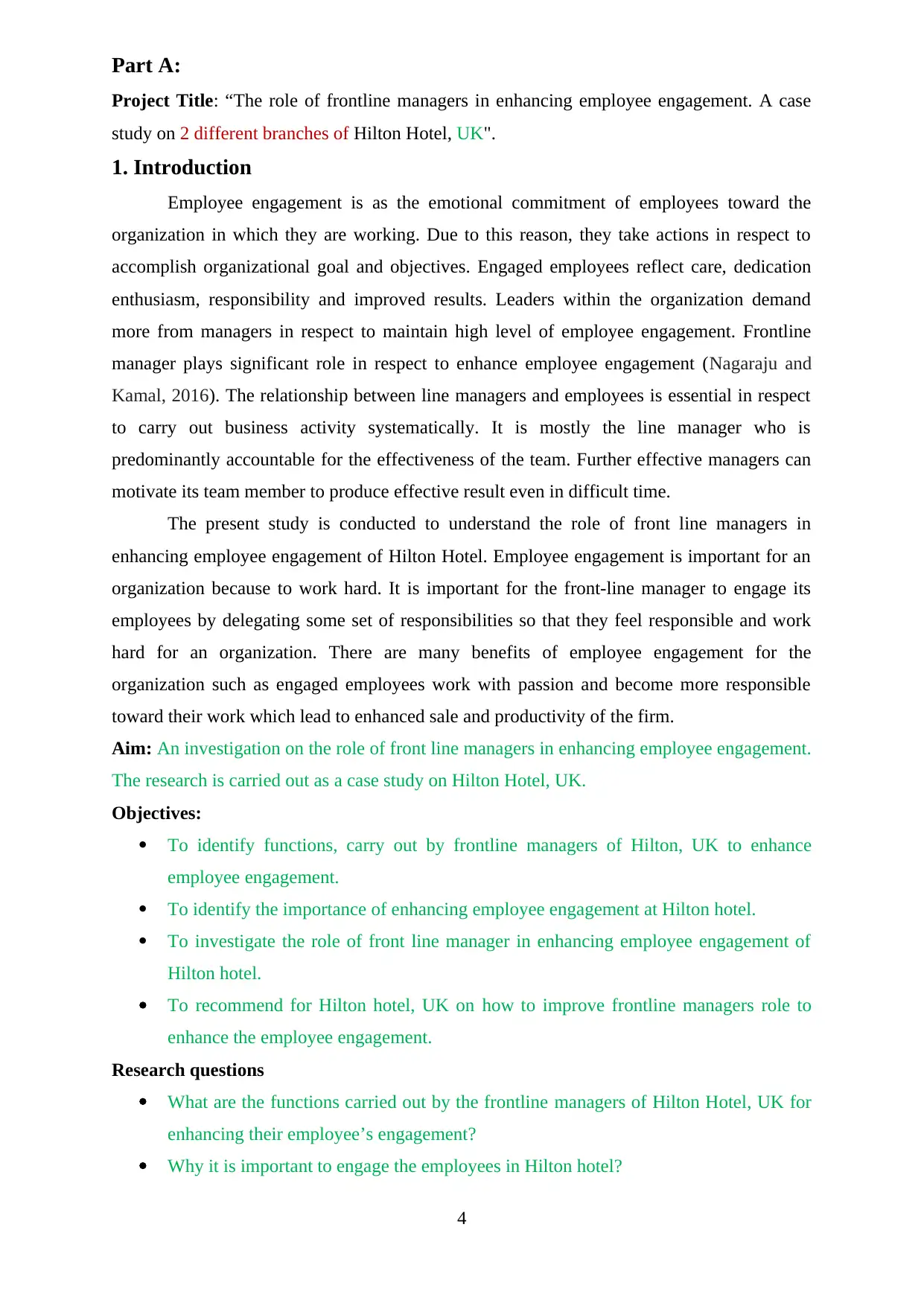
Part A:
Project Title: “The role of frontline managers in enhancing employee engagement. A case
study on 2 different branches of Hilton Hotel, UK".
1. Introduction
Employee engagement is as the emotional commitment of employees toward the
organization in which they are working. Due to this reason, they take actions in respect to
accomplish organizational goal and objectives. Engaged employees reflect care, dedication
enthusiasm, responsibility and improved results. Leaders within the organization demand
more from managers in respect to maintain high level of employee engagement. Frontline
manager plays significant role in respect to enhance employee engagement (Nagaraju and
Kamal, 2016). The relationship between line managers and employees is essential in respect
to carry out business activity systematically. It is mostly the line manager who is
predominantly accountable for the effectiveness of the team. Further effective managers can
motivate its team member to produce effective result even in difficult time.
The present study is conducted to understand the role of front line managers in
enhancing employee engagement of Hilton Hotel. Employee engagement is important for an
organization because to work hard. It is important for the front-line manager to engage its
employees by delegating some set of responsibilities so that they feel responsible and work
hard for an organization. There are many benefits of employee engagement for the
organization such as engaged employees work with passion and become more responsible
toward their work which lead to enhanced sale and productivity of the firm.
Aim: An investigation on the role of front line managers in enhancing employee engagement.
The research is carried out as a case study on Hilton Hotel, UK.
Objectives:
To identify functions, carry out by frontline managers of Hilton, UK to enhance
employee engagement.
To identify the importance of enhancing employee engagement at Hilton hotel.
To investigate the role of front line manager in enhancing employee engagement of
Hilton hotel.
To recommend for Hilton hotel, UK on how to improve frontline managers role to
enhance the employee engagement.
Research questions
What are the functions carried out by the frontline managers of Hilton Hotel, UK for
enhancing their employee’s engagement?
Why it is important to engage the employees in Hilton hotel?
4
Project Title: “The role of frontline managers in enhancing employee engagement. A case
study on 2 different branches of Hilton Hotel, UK".
1. Introduction
Employee engagement is as the emotional commitment of employees toward the
organization in which they are working. Due to this reason, they take actions in respect to
accomplish organizational goal and objectives. Engaged employees reflect care, dedication
enthusiasm, responsibility and improved results. Leaders within the organization demand
more from managers in respect to maintain high level of employee engagement. Frontline
manager plays significant role in respect to enhance employee engagement (Nagaraju and
Kamal, 2016). The relationship between line managers and employees is essential in respect
to carry out business activity systematically. It is mostly the line manager who is
predominantly accountable for the effectiveness of the team. Further effective managers can
motivate its team member to produce effective result even in difficult time.
The present study is conducted to understand the role of front line managers in
enhancing employee engagement of Hilton Hotel. Employee engagement is important for an
organization because to work hard. It is important for the front-line manager to engage its
employees by delegating some set of responsibilities so that they feel responsible and work
hard for an organization. There are many benefits of employee engagement for the
organization such as engaged employees work with passion and become more responsible
toward their work which lead to enhanced sale and productivity of the firm.
Aim: An investigation on the role of front line managers in enhancing employee engagement.
The research is carried out as a case study on Hilton Hotel, UK.
Objectives:
To identify functions, carry out by frontline managers of Hilton, UK to enhance
employee engagement.
To identify the importance of enhancing employee engagement at Hilton hotel.
To investigate the role of front line manager in enhancing employee engagement of
Hilton hotel.
To recommend for Hilton hotel, UK on how to improve frontline managers role to
enhance the employee engagement.
Research questions
What are the functions carried out by the frontline managers of Hilton Hotel, UK for
enhancing their employee’s engagement?
Why it is important to engage the employees in Hilton hotel?
4
Secure Best Marks with AI Grader
Need help grading? Try our AI Grader for instant feedback on your assignments.
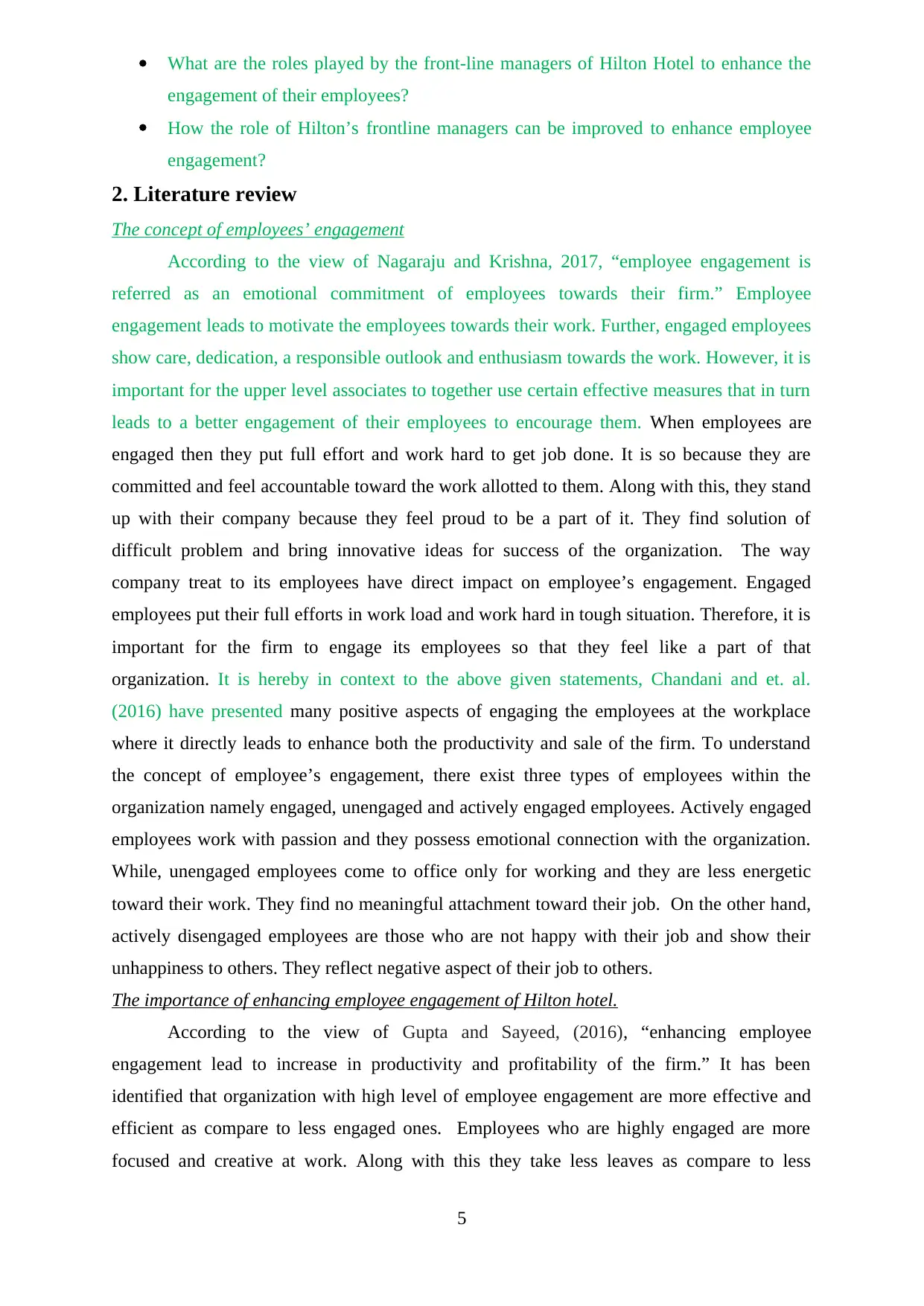
What are the roles played by the front-line managers of Hilton Hotel to enhance the
engagement of their employees?
How the role of Hilton’s frontline managers can be improved to enhance employee
engagement?
2. Literature review
The concept of employees’ engagement
According to the view of Nagaraju and Krishna, 2017, “employee engagement is
referred as an emotional commitment of employees towards their firm.” Employee
engagement leads to motivate the employees towards their work. Further, engaged employees
show care, dedication, a responsible outlook and enthusiasm towards the work. However, it is
important for the upper level associates to together use certain effective measures that in turn
leads to a better engagement of their employees to encourage them. When employees are
engaged then they put full effort and work hard to get job done. It is so because they are
committed and feel accountable toward the work allotted to them. Along with this, they stand
up with their company because they feel proud to be a part of it. They find solution of
difficult problem and bring innovative ideas for success of the organization. The way
company treat to its employees have direct impact on employee’s engagement. Engaged
employees put their full efforts in work load and work hard in tough situation. Therefore, it is
important for the firm to engage its employees so that they feel like a part of that
organization. It is hereby in context to the above given statements, Chandani and et. al.
(2016) have presented many positive aspects of engaging the employees at the workplace
where it directly leads to enhance both the productivity and sale of the firm. To understand
the concept of employee’s engagement, there exist three types of employees within the
organization namely engaged, unengaged and actively engaged employees. Actively engaged
employees work with passion and they possess emotional connection with the organization.
While, unengaged employees come to office only for working and they are less energetic
toward their work. They find no meaningful attachment toward their job. On the other hand,
actively disengaged employees are those who are not happy with their job and show their
unhappiness to others. They reflect negative aspect of their job to others.
The importance of enhancing employee engagement of Hilton hotel.
According to the view of Gupta and Sayeed, (2016), “enhancing employee
engagement lead to increase in productivity and profitability of the firm.” It has been
identified that organization with high level of employee engagement are more effective and
efficient as compare to less engaged ones. Employees who are highly engaged are more
focused and creative at work. Along with this they take less leaves as compare to less
5
engagement of their employees?
How the role of Hilton’s frontline managers can be improved to enhance employee
engagement?
2. Literature review
The concept of employees’ engagement
According to the view of Nagaraju and Krishna, 2017, “employee engagement is
referred as an emotional commitment of employees towards their firm.” Employee
engagement leads to motivate the employees towards their work. Further, engaged employees
show care, dedication, a responsible outlook and enthusiasm towards the work. However, it is
important for the upper level associates to together use certain effective measures that in turn
leads to a better engagement of their employees to encourage them. When employees are
engaged then they put full effort and work hard to get job done. It is so because they are
committed and feel accountable toward the work allotted to them. Along with this, they stand
up with their company because they feel proud to be a part of it. They find solution of
difficult problem and bring innovative ideas for success of the organization. The way
company treat to its employees have direct impact on employee’s engagement. Engaged
employees put their full efforts in work load and work hard in tough situation. Therefore, it is
important for the firm to engage its employees so that they feel like a part of that
organization. It is hereby in context to the above given statements, Chandani and et. al.
(2016) have presented many positive aspects of engaging the employees at the workplace
where it directly leads to enhance both the productivity and sale of the firm. To understand
the concept of employee’s engagement, there exist three types of employees within the
organization namely engaged, unengaged and actively engaged employees. Actively engaged
employees work with passion and they possess emotional connection with the organization.
While, unengaged employees come to office only for working and they are less energetic
toward their work. They find no meaningful attachment toward their job. On the other hand,
actively disengaged employees are those who are not happy with their job and show their
unhappiness to others. They reflect negative aspect of their job to others.
The importance of enhancing employee engagement of Hilton hotel.
According to the view of Gupta and Sayeed, (2016), “enhancing employee
engagement lead to increase in productivity and profitability of the firm.” It has been
identified that organization with high level of employee engagement are more effective and
efficient as compare to less engaged ones. Employees who are highly engaged are more
focused and creative at work. Along with this they take less leaves as compare to less
5
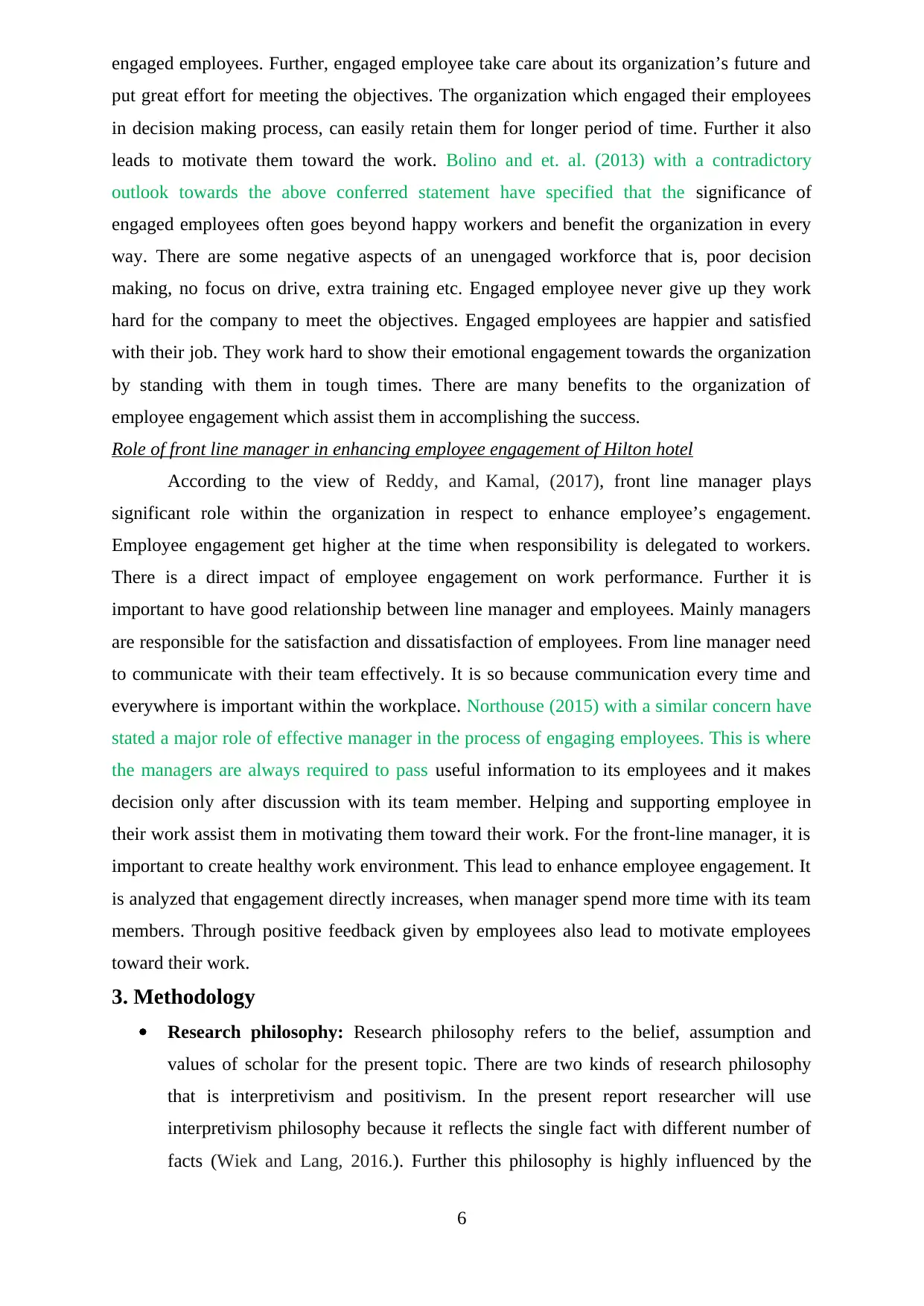
engaged employees. Further, engaged employee take care about its organization’s future and
put great effort for meeting the objectives. The organization which engaged their employees
in decision making process, can easily retain them for longer period of time. Further it also
leads to motivate them toward the work. Bolino and et. al. (2013) with a contradictory
outlook towards the above conferred statement have specified that the significance of
engaged employees often goes beyond happy workers and benefit the organization in every
way. There are some negative aspects of an unengaged workforce that is, poor decision
making, no focus on drive, extra training etc. Engaged employee never give up they work
hard for the company to meet the objectives. Engaged employees are happier and satisfied
with their job. They work hard to show their emotional engagement towards the organization
by standing with them in tough times. There are many benefits to the organization of
employee engagement which assist them in accomplishing the success.
Role of front line manager in enhancing employee engagement of Hilton hotel
According to the view of Reddy, and Kamal, (2017), front line manager plays
significant role within the organization in respect to enhance employee’s engagement.
Employee engagement get higher at the time when responsibility is delegated to workers.
There is a direct impact of employee engagement on work performance. Further it is
important to have good relationship between line manager and employees. Mainly managers
are responsible for the satisfaction and dissatisfaction of employees. From line manager need
to communicate with their team effectively. It is so because communication every time and
everywhere is important within the workplace. Northouse (2015) with a similar concern have
stated a major role of effective manager in the process of engaging employees. This is where
the managers are always required to pass useful information to its employees and it makes
decision only after discussion with its team member. Helping and supporting employee in
their work assist them in motivating them toward their work. For the front-line manager, it is
important to create healthy work environment. This lead to enhance employee engagement. It
is analyzed that engagement directly increases, when manager spend more time with its team
members. Through positive feedback given by employees also lead to motivate employees
toward their work.
3. Methodology
Research philosophy: Research philosophy refers to the belief, assumption and
values of scholar for the present topic. There are two kinds of research philosophy
that is interpretivism and positivism. In the present report researcher will use
interpretivism philosophy because it reflects the single fact with different number of
facts (Wiek and Lang, 2016.). Further this philosophy is highly influenced by the
6
put great effort for meeting the objectives. The organization which engaged their employees
in decision making process, can easily retain them for longer period of time. Further it also
leads to motivate them toward the work. Bolino and et. al. (2013) with a contradictory
outlook towards the above conferred statement have specified that the significance of
engaged employees often goes beyond happy workers and benefit the organization in every
way. There are some negative aspects of an unengaged workforce that is, poor decision
making, no focus on drive, extra training etc. Engaged employee never give up they work
hard for the company to meet the objectives. Engaged employees are happier and satisfied
with their job. They work hard to show their emotional engagement towards the organization
by standing with them in tough times. There are many benefits to the organization of
employee engagement which assist them in accomplishing the success.
Role of front line manager in enhancing employee engagement of Hilton hotel
According to the view of Reddy, and Kamal, (2017), front line manager plays
significant role within the organization in respect to enhance employee’s engagement.
Employee engagement get higher at the time when responsibility is delegated to workers.
There is a direct impact of employee engagement on work performance. Further it is
important to have good relationship between line manager and employees. Mainly managers
are responsible for the satisfaction and dissatisfaction of employees. From line manager need
to communicate with their team effectively. It is so because communication every time and
everywhere is important within the workplace. Northouse (2015) with a similar concern have
stated a major role of effective manager in the process of engaging employees. This is where
the managers are always required to pass useful information to its employees and it makes
decision only after discussion with its team member. Helping and supporting employee in
their work assist them in motivating them toward their work. For the front-line manager, it is
important to create healthy work environment. This lead to enhance employee engagement. It
is analyzed that engagement directly increases, when manager spend more time with its team
members. Through positive feedback given by employees also lead to motivate employees
toward their work.
3. Methodology
Research philosophy: Research philosophy refers to the belief, assumption and
values of scholar for the present topic. There are two kinds of research philosophy
that is interpretivism and positivism. In the present report researcher will use
interpretivism philosophy because it reflects the single fact with different number of
facts (Wiek and Lang, 2016.). Further this philosophy is highly influenced by the
6
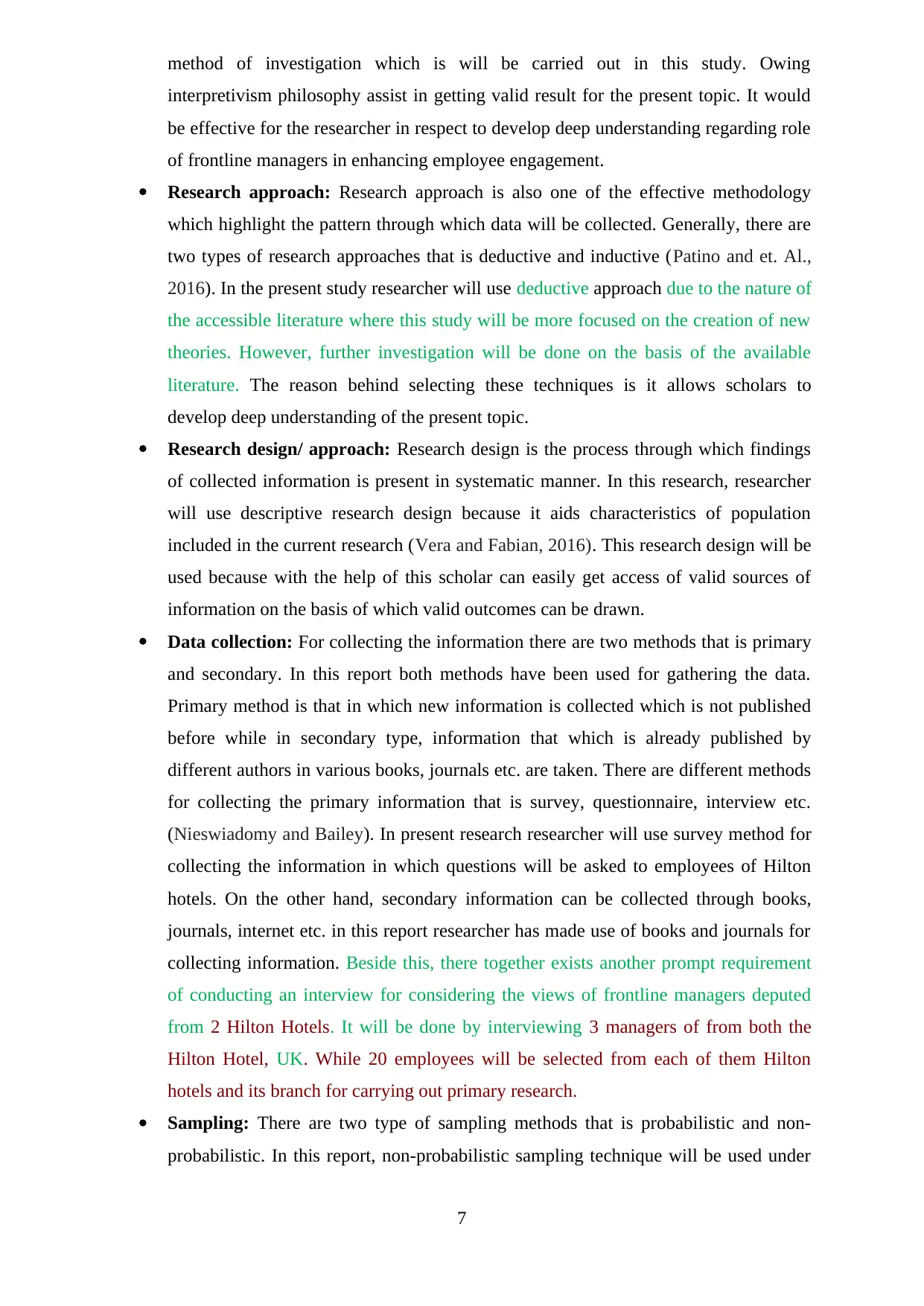
method of investigation which is will be carried out in this study. Owing
interpretivism philosophy assist in getting valid result for the present topic. It would
be effective for the researcher in respect to develop deep understanding regarding role
of frontline managers in enhancing employee engagement.
Research approach: Research approach is also one of the effective methodology
which highlight the pattern through which data will be collected. Generally, there are
two types of research approaches that is deductive and inductive (Patino and et. Al.,
2016). In the present study researcher will use deductive approach due to the nature of
the accessible literature where this study will be more focused on the creation of new
theories. However, further investigation will be done on the basis of the available
literature. The reason behind selecting these techniques is it allows scholars to
develop deep understanding of the present topic.
Research design/ approach: Research design is the process through which findings
of collected information is present in systematic manner. In this research, researcher
will use descriptive research design because it aids characteristics of population
included in the current research (Vera and Fabian, 2016). This research design will be
used because with the help of this scholar can easily get access of valid sources of
information on the basis of which valid outcomes can be drawn.
Data collection: For collecting the information there are two methods that is primary
and secondary. In this report both methods have been used for gathering the data.
Primary method is that in which new information is collected which is not published
before while in secondary type, information that which is already published by
different authors in various books, journals etc. are taken. There are different methods
for collecting the primary information that is survey, questionnaire, interview etc.
(Nieswiadomy and Bailey). In present research researcher will use survey method for
collecting the information in which questions will be asked to employees of Hilton
hotels. On the other hand, secondary information can be collected through books,
journals, internet etc. in this report researcher has made use of books and journals for
collecting information. Beside this, there together exists another prompt requirement
of conducting an interview for considering the views of frontline managers deputed
from 2 Hilton Hotels. It will be done by interviewing 3 managers of from both the
Hilton Hotel, UK. While 20 employees will be selected from each of them Hilton
hotels and its branch for carrying out primary research.
Sampling: There are two type of sampling methods that is probabilistic and non-
probabilistic. In this report, non-probabilistic sampling technique will be used under
7
interpretivism philosophy assist in getting valid result for the present topic. It would
be effective for the researcher in respect to develop deep understanding regarding role
of frontline managers in enhancing employee engagement.
Research approach: Research approach is also one of the effective methodology
which highlight the pattern through which data will be collected. Generally, there are
two types of research approaches that is deductive and inductive (Patino and et. Al.,
2016). In the present study researcher will use deductive approach due to the nature of
the accessible literature where this study will be more focused on the creation of new
theories. However, further investigation will be done on the basis of the available
literature. The reason behind selecting these techniques is it allows scholars to
develop deep understanding of the present topic.
Research design/ approach: Research design is the process through which findings
of collected information is present in systematic manner. In this research, researcher
will use descriptive research design because it aids characteristics of population
included in the current research (Vera and Fabian, 2016). This research design will be
used because with the help of this scholar can easily get access of valid sources of
information on the basis of which valid outcomes can be drawn.
Data collection: For collecting the information there are two methods that is primary
and secondary. In this report both methods have been used for gathering the data.
Primary method is that in which new information is collected which is not published
before while in secondary type, information that which is already published by
different authors in various books, journals etc. are taken. There are different methods
for collecting the primary information that is survey, questionnaire, interview etc.
(Nieswiadomy and Bailey). In present research researcher will use survey method for
collecting the information in which questions will be asked to employees of Hilton
hotels. On the other hand, secondary information can be collected through books,
journals, internet etc. in this report researcher has made use of books and journals for
collecting information. Beside this, there together exists another prompt requirement
of conducting an interview for considering the views of frontline managers deputed
from 2 Hilton Hotels. It will be done by interviewing 3 managers of from both the
Hilton Hotel, UK. While 20 employees will be selected from each of them Hilton
hotels and its branch for carrying out primary research.
Sampling: There are two type of sampling methods that is probabilistic and non-
probabilistic. In this report, non-probabilistic sampling technique will be used under
7
Paraphrase This Document
Need a fresh take? Get an instant paraphrase of this document with our AI Paraphraser
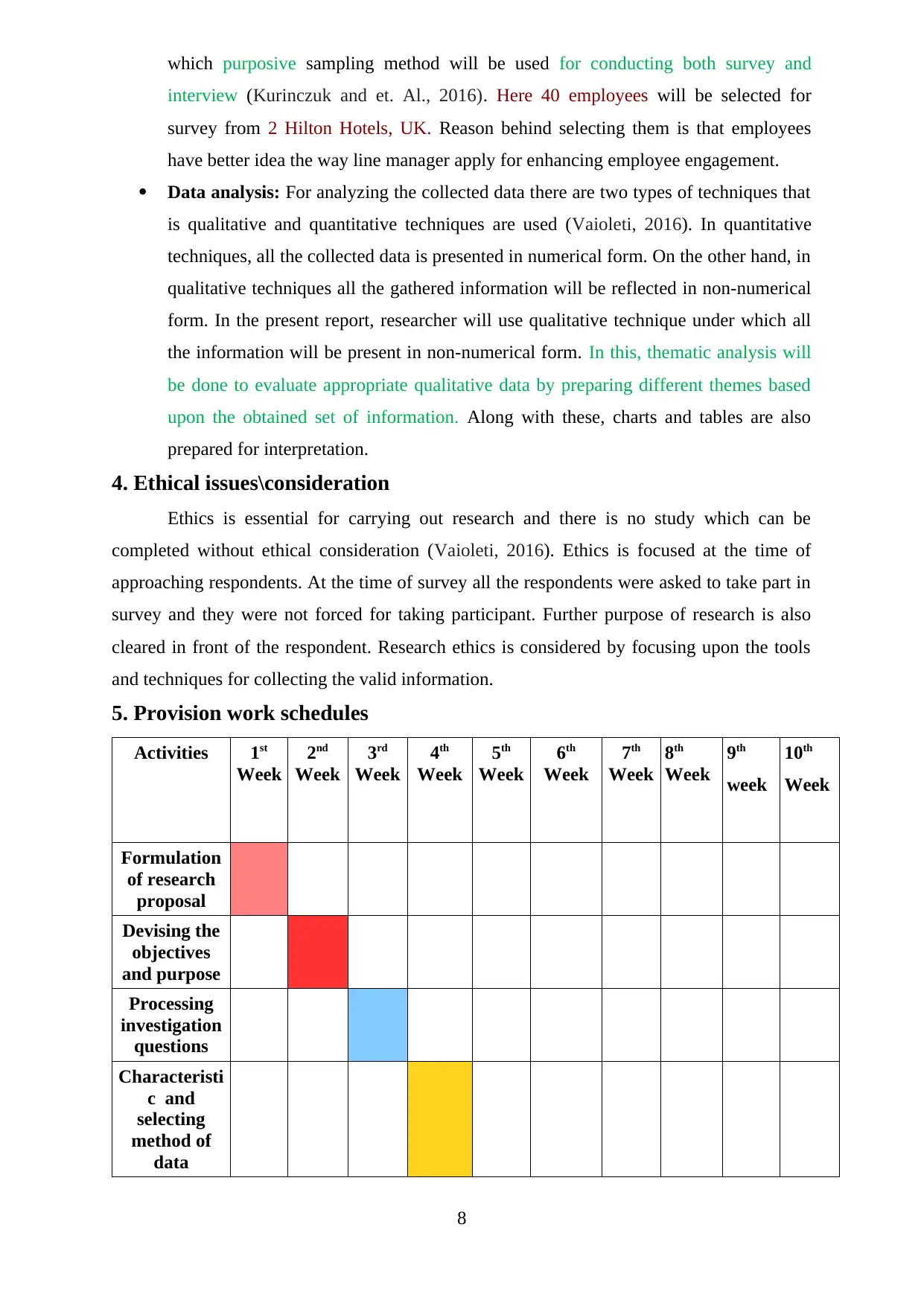
which purposive sampling method will be used for conducting both survey and
interview (Kurinczuk and et. Al., 2016). Here 40 employees will be selected for
survey from 2 Hilton Hotels, UK. Reason behind selecting them is that employees
have better idea the way line manager apply for enhancing employee engagement.
Data analysis: For analyzing the collected data there are two types of techniques that
is qualitative and quantitative techniques are used (Vaioleti, 2016). In quantitative
techniques, all the collected data is presented in numerical form. On the other hand, in
qualitative techniques all the gathered information will be reflected in non-numerical
form. In the present report, researcher will use qualitative technique under which all
the information will be present in non-numerical form. In this, thematic analysis will
be done to evaluate appropriate qualitative data by preparing different themes based
upon the obtained set of information. Along with these, charts and tables are also
prepared for interpretation.
4. Ethical issues\consideration
Ethics is essential for carrying out research and there is no study which can be
completed without ethical consideration (Vaioleti, 2016). Ethics is focused at the time of
approaching respondents. At the time of survey all the respondents were asked to take part in
survey and they were not forced for taking participant. Further purpose of research is also
cleared in front of the respondent. Research ethics is considered by focusing upon the tools
and techniques for collecting the valid information.
5. Provision work schedules
Activities 1st
Week
2nd
Week
3rd
Week
4th
Week
5th
Week
6th
Week
7th
Week
8th
Week
9th
week
10th
Week
Formulation
of research
proposal
Devising the
objectives
and purpose
Processing
investigation
questions
Characteristi
c and
selecting
method of
data
8
interview (Kurinczuk and et. Al., 2016). Here 40 employees will be selected for
survey from 2 Hilton Hotels, UK. Reason behind selecting them is that employees
have better idea the way line manager apply for enhancing employee engagement.
Data analysis: For analyzing the collected data there are two types of techniques that
is qualitative and quantitative techniques are used (Vaioleti, 2016). In quantitative
techniques, all the collected data is presented in numerical form. On the other hand, in
qualitative techniques all the gathered information will be reflected in non-numerical
form. In the present report, researcher will use qualitative technique under which all
the information will be present in non-numerical form. In this, thematic analysis will
be done to evaluate appropriate qualitative data by preparing different themes based
upon the obtained set of information. Along with these, charts and tables are also
prepared for interpretation.
4. Ethical issues\consideration
Ethics is essential for carrying out research and there is no study which can be
completed without ethical consideration (Vaioleti, 2016). Ethics is focused at the time of
approaching respondents. At the time of survey all the respondents were asked to take part in
survey and they were not forced for taking participant. Further purpose of research is also
cleared in front of the respondent. Research ethics is considered by focusing upon the tools
and techniques for collecting the valid information.
5. Provision work schedules
Activities 1st
Week
2nd
Week
3rd
Week
4th
Week
5th
Week
6th
Week
7th
Week
8th
Week
9th
week
10th
Week
Formulation
of research
proposal
Devising the
objectives
and purpose
Processing
investigation
questions
Characteristi
c and
selecting
method of
data
8
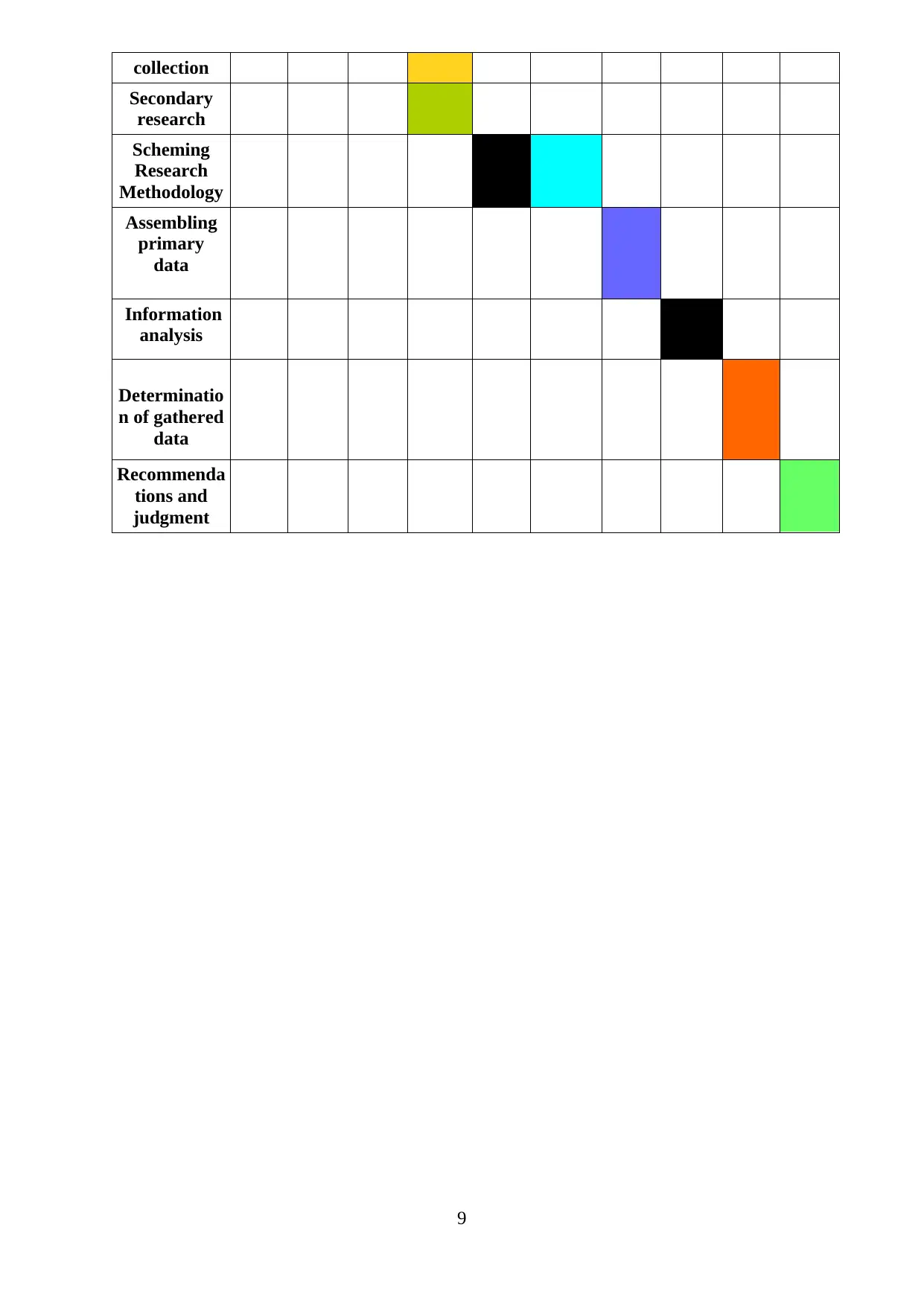
collection
Secondary
research
Scheming
Research
Methodology
Assembling
primary
data
Information
analysis
Determinatio
n of gathered
data
Recommenda
tions and
judgment
9
Secondary
research
Scheming
Research
Methodology
Assembling
primary
data
Information
analysis
Determinatio
n of gathered
data
Recommenda
tions and
judgment
9
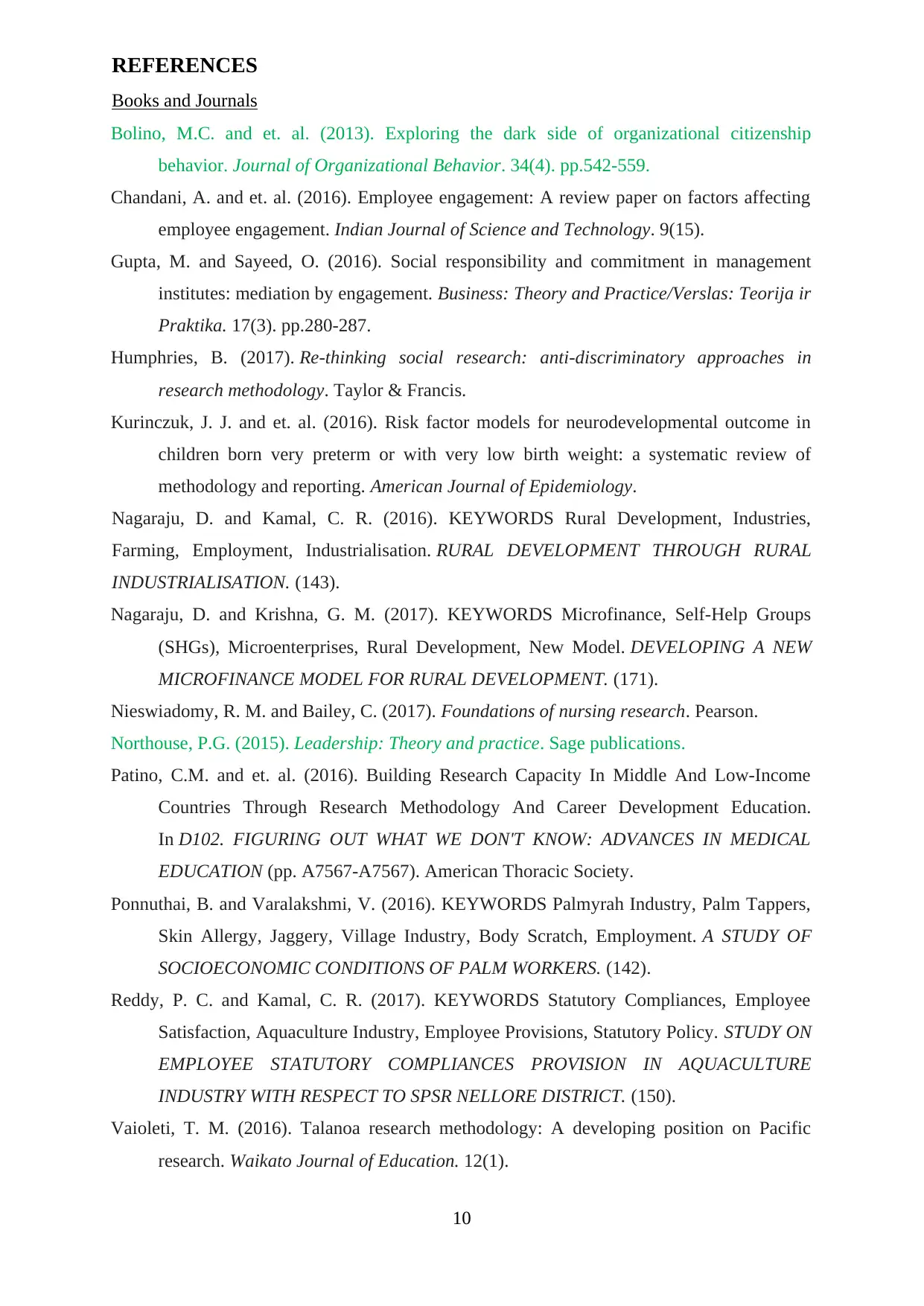
REFERENCES
Books and Journals
Bolino, M.C. and et. al. (2013). Exploring the dark side of organizational citizenship
behavior. Journal of Organizational Behavior. 34(4). pp.542-559.
Chandani, A. and et. al. (2016). Employee engagement: A review paper on factors affecting
employee engagement. Indian Journal of Science and Technology. 9(15).
Gupta, M. and Sayeed, O. (2016). Social responsibility and commitment in management
institutes: mediation by engagement. Business: Theory and Practice/Verslas: Teorija ir
Praktika. 17(3). pp.280-287.
Humphries, B. (2017). Re-thinking social research: anti-discriminatory approaches in
research methodology. Taylor & Francis.
Kurinczuk, J. J. and et. al. (2016). Risk factor models for neurodevelopmental outcome in
children born very preterm or with very low birth weight: a systematic review of
methodology and reporting. American Journal of Epidemiology.
Nagaraju, D. and Kamal, C. R. (2016). KEYWORDS Rural Development, Industries,
Farming, Employment, Industrialisation. RURAL DEVELOPMENT THROUGH RURAL
INDUSTRIALISATION. (143).
Nagaraju, D. and Krishna, G. M. (2017). KEYWORDS Microfinance, Self-Help Groups
(SHGs), Microenterprises, Rural Development, New Model. DEVELOPING A NEW
MICROFINANCE MODEL FOR RURAL DEVELOPMENT. (171).
Nieswiadomy, R. M. and Bailey, C. (2017). Foundations of nursing research. Pearson.
Northouse, P.G. (2015). Leadership: Theory and practice. Sage publications.
Patino, C.M. and et. al. (2016). Building Research Capacity In Middle And Low-Income
Countries Through Research Methodology And Career Development Education.
In D102. FIGURING OUT WHAT WE DON'T KNOW: ADVANCES IN MEDICAL
EDUCATION (pp. A7567-A7567). American Thoracic Society.
Ponnuthai, B. and Varalakshmi, V. (2016). KEYWORDS Palmyrah Industry, Palm Tappers,
Skin Allergy, Jaggery, Village Industry, Body Scratch, Employment. A STUDY OF
SOCIOECONOMIC CONDITIONS OF PALM WORKERS. (142).
Reddy, P. C. and Kamal, C. R. (2017). KEYWORDS Statutory Compliances, Employee
Satisfaction, Aquaculture Industry, Employee Provisions, Statutory Policy. STUDY ON
EMPLOYEE STATUTORY COMPLIANCES PROVISION IN AQUACULTURE
INDUSTRY WITH RESPECT TO SPSR NELLORE DISTRICT. (150).
Vaioleti, T. M. (2016). Talanoa research methodology: A developing position on Pacific
research. Waikato Journal of Education. 12(1).
10
Books and Journals
Bolino, M.C. and et. al. (2013). Exploring the dark side of organizational citizenship
behavior. Journal of Organizational Behavior. 34(4). pp.542-559.
Chandani, A. and et. al. (2016). Employee engagement: A review paper on factors affecting
employee engagement. Indian Journal of Science and Technology. 9(15).
Gupta, M. and Sayeed, O. (2016). Social responsibility and commitment in management
institutes: mediation by engagement. Business: Theory and Practice/Verslas: Teorija ir
Praktika. 17(3). pp.280-287.
Humphries, B. (2017). Re-thinking social research: anti-discriminatory approaches in
research methodology. Taylor & Francis.
Kurinczuk, J. J. and et. al. (2016). Risk factor models for neurodevelopmental outcome in
children born very preterm or with very low birth weight: a systematic review of
methodology and reporting. American Journal of Epidemiology.
Nagaraju, D. and Kamal, C. R. (2016). KEYWORDS Rural Development, Industries,
Farming, Employment, Industrialisation. RURAL DEVELOPMENT THROUGH RURAL
INDUSTRIALISATION. (143).
Nagaraju, D. and Krishna, G. M. (2017). KEYWORDS Microfinance, Self-Help Groups
(SHGs), Microenterprises, Rural Development, New Model. DEVELOPING A NEW
MICROFINANCE MODEL FOR RURAL DEVELOPMENT. (171).
Nieswiadomy, R. M. and Bailey, C. (2017). Foundations of nursing research. Pearson.
Northouse, P.G. (2015). Leadership: Theory and practice. Sage publications.
Patino, C.M. and et. al. (2016). Building Research Capacity In Middle And Low-Income
Countries Through Research Methodology And Career Development Education.
In D102. FIGURING OUT WHAT WE DON'T KNOW: ADVANCES IN MEDICAL
EDUCATION (pp. A7567-A7567). American Thoracic Society.
Ponnuthai, B. and Varalakshmi, V. (2016). KEYWORDS Palmyrah Industry, Palm Tappers,
Skin Allergy, Jaggery, Village Industry, Body Scratch, Employment. A STUDY OF
SOCIOECONOMIC CONDITIONS OF PALM WORKERS. (142).
Reddy, P. C. and Kamal, C. R. (2017). KEYWORDS Statutory Compliances, Employee
Satisfaction, Aquaculture Industry, Employee Provisions, Statutory Policy. STUDY ON
EMPLOYEE STATUTORY COMPLIANCES PROVISION IN AQUACULTURE
INDUSTRY WITH RESPECT TO SPSR NELLORE DISTRICT. (150).
Vaioleti, T. M. (2016). Talanoa research methodology: A developing position on Pacific
research. Waikato Journal of Education. 12(1).
10
Secure Best Marks with AI Grader
Need help grading? Try our AI Grader for instant feedback on your assignments.
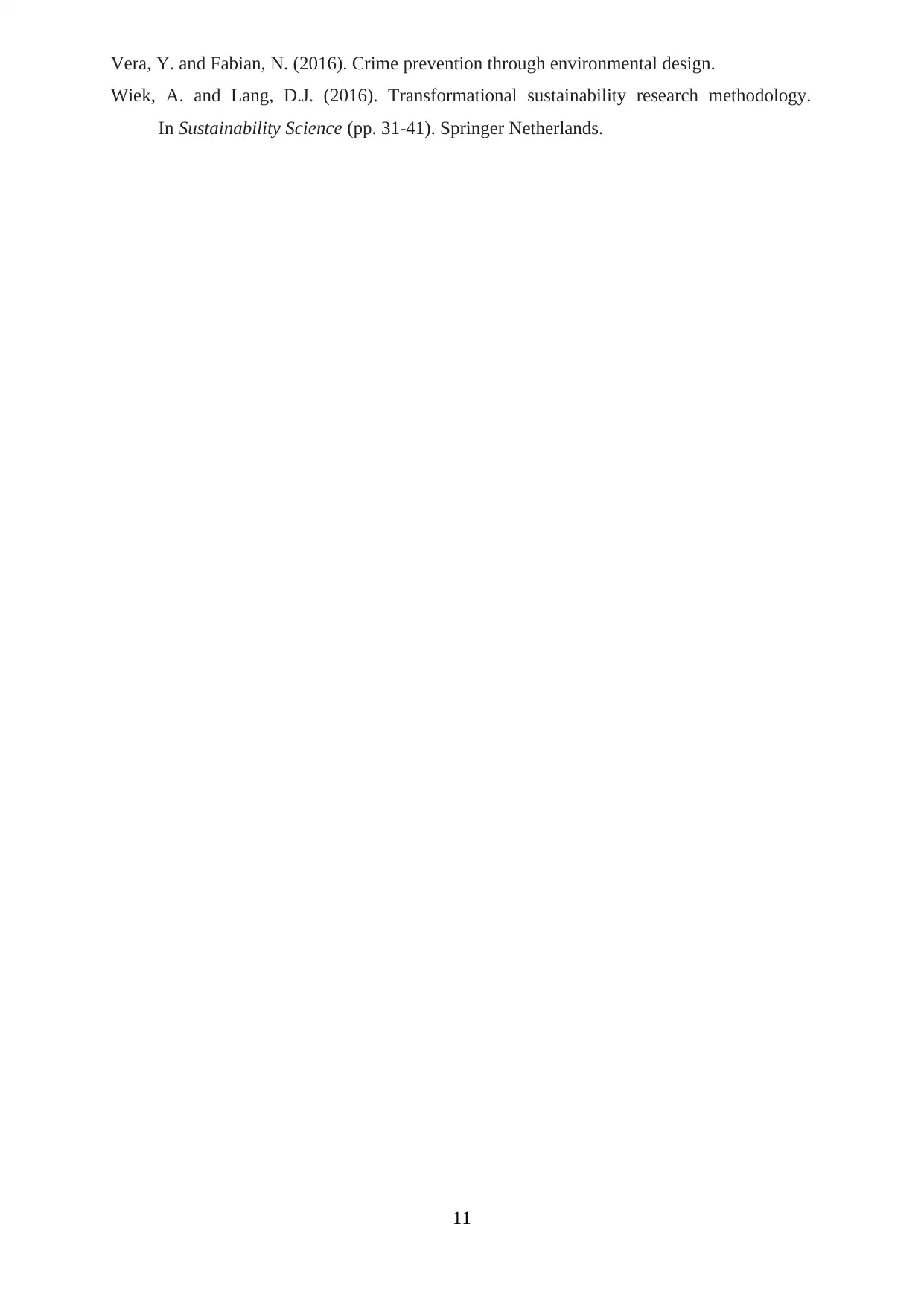
Vera, Y. and Fabian, N. (2016). Crime prevention through environmental design.
Wiek, A. and Lang, D.J. (2016). Transformational sustainability research methodology.
In Sustainability Science (pp. 31-41). Springer Netherlands.
11
Wiek, A. and Lang, D.J. (2016). Transformational sustainability research methodology.
In Sustainability Science (pp. 31-41). Springer Netherlands.
11
1 out of 11
Related Documents
Your All-in-One AI-Powered Toolkit for Academic Success.
+13062052269
info@desklib.com
Available 24*7 on WhatsApp / Email
![[object Object]](/_next/static/media/star-bottom.7253800d.svg)
Unlock your academic potential
© 2024 | Zucol Services PVT LTD | All rights reserved.





